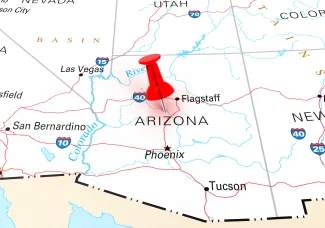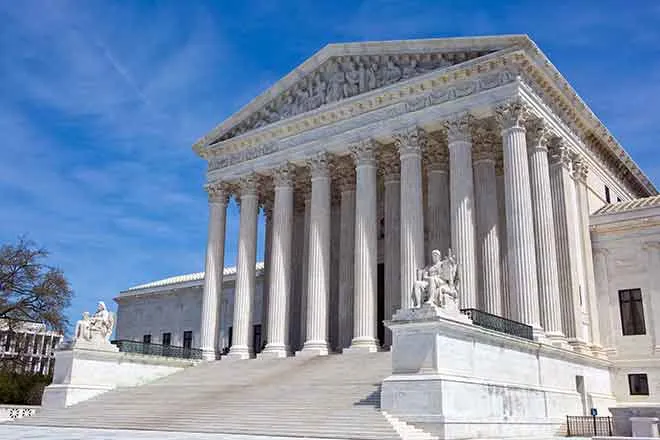
Diné College, ASU collaborate on Navajo Law Program
(Arizona Mirror) Navajo students interested in studying the fundamentals of Navajo Nation law can now do so closer to home, as Diné College and Arizona State University are joining forces to offer a new Bachelor of Arts in Navajo Law.
“We wanted to have a program that would meet students where they are,” said Stacy Leeds, dean of the Sandra Day O’Connor College of Law at Arizona State University.
The new bachelor’s law program, which will launch at Diné College in the fall, is the first of its kind collaboration between a tribal college and a top public law school.

“The inception of the BA in Navajo Law program predates the pandemic, born out of the pressing need for legal professionals deeply versed in Navajo fundamental law, federal and state statutes, and Navajo Nation legal frameworks,” Patrick Blackwater, dean of the School of Business and Social Sciences at Diné College, said in a press release.
Diné College said the curriculum will cover various aspects of the legal system, including regulations, policy development, the judicial structure, and formal and informal legal methodologies.
“This program is meticulously crafted to furnish students with a holistic comprehension of legal fundamentals, empowering them to pursue impactful careers as legal scholars, advocates, policymakers, and educators within the legal sphere,” Blackwater added.
The new program will offer students an immersive, hands-on learning experience, according to Diné College, and it will emphasize the practical application of laws and the nuanced navigation of legal landscapes.
“Our mission is to furnish students not only with theoretical knowledge but also with the practical acumen to effectively apply laws and legal processes within the Navajo Nation and beyond,” Diné College President Charles Roessel said in a written statement. “This program serves as a beacon of hope, a testament to our steadfast commitment to advancing justice and sovereignty through education.”
Leeds said both schools worked together to develop the bachelor’s program curriculum, and Diné College examined what courses they may have had that would qualify for this type of program.
“Each university will be working with people who have practiced law on the Navajo Nation,” Leeds said.
She said that the programs are also looking to include community input because they want to ensure that the students are getting the best experiences and are on their best path if they are going to take the Navajo bar.
“It really was a collaborative effort, and we’ll continue to have it be a collaborative effort moving forward,” Leeds said.
Leeds told the Mirror that the bachelor’s degree program offered at Diné College in collaboration with ASU is designed for undergraduate students fresh out of high school, starting an undergrad degree or transferring schools.
Students in the bachelor’s program will get their undergraduate degree entirely at Diné College. When they complete the program, they can quickly enter the workforce or continue their education in the graduate programs available at ASU.
If the bachelor’s degree is all the education the student wishes to pursue, Leeds said they will be prepared to be legal professionals, hopefully on the Navajo Nation.
But alongside the new bachelor’s program, Leeds said that ASU now offers graduate-level Master of Legal Studies and the Master of Laws degrees in tribal policy, law, and government, with an emphasis on Navajo law.
“When they finish that master’s degree program, they would be equipped to take the Navajo Bar and pass that and be an advocate there on the reservation,” Leeds said.
The ASU law school has a long-standing partnership with the Navajo Nation, including recruiting and retaining Navajo students within ASU Law’s Juris Doctor program, which features an Indian law certificate program.
From the bachelor’s program to ASU’s juris doctor program, there are now four interrelated degree programs available to Indigenous students that maximize their opportunities in education.
According to ASU, the degree programs will collectively increase the number of legal professionals licensed to practice law on and around the Navajo Nation.
Leeds said they focused on Navajo Nation law because its legal system is special. The tribe has been able to retain traditional law and legal systems.
“It’s very impressive,” Leeds said because, over the last century, the Navajo Nation has held on to those foundational laws while many other tribes have not had the same experience.
She said that is why it was important for the Navajo Nation to take the lead on their collaboration with the ASU law school, which provides a way for the tribe to continue to retain and grow their body of laws significantly.
Being able to bring a legal program to Diné College has been discussed for several years, Leeds said, and she recalls participating in the discussion in 2019 before she started working at ASU, which is why she’s happy to see it come to fruition.
“I really think that this model that we’ve mapped out could really be replicated with other tribes and other universities,” Leeds said. “It’s a great model for making sure that you have a real comprehensive approach to legal education, that it’s not limited to a few people who are lucky enough to get an opportunity to go to an American law school.”
Arizona Mirror is part of States Newsroom, a nonprofit news network supported by grants and a coalition of donors as a 501c(3) public charity. Arizona Mirror maintains editorial independence. Contact Editor Jim Small for questions: info@azmirror.com. Follow Arizona Mirror on Facebook and Twitter.

















